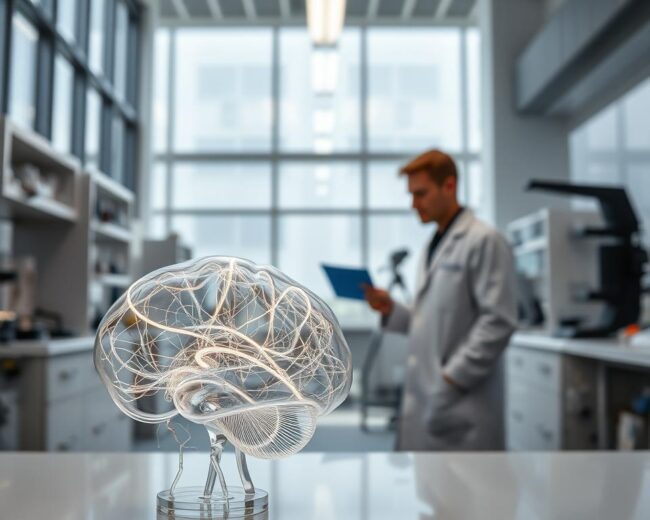Did you know that just 15 minutes of mindfulness daily can boost your focus and memory in eight weeks? Today, distractions from digital alerts to multitasking make staying mentally fit more important than ever. Mental fitness means having a sharp mind, balanced emotions, and being ready to face challenges. It’s key for keeping your mind healthy and feeling good mentally.
Exercising regularly, like running for 15 minutes or walking for an hour, can cut depression risk by 26 percent. Doing puzzles and memory games can also make your brain work better and keep your mind sharp. Eating a diet full of fruits, veggies, good proteins, and healthy fats is also good for your mental health.
Key Takeaways
- Practicing mindfulness daily can improve attention and memory within eight weeks, supporting mental fitness and cognitive health.
- Regular physical activity can reduce the risk of major depression and improve mental well-being, which is essential for mental fitness.
- Cognitive exercises, such as puzzles and memory games, can enhance brain function and promote mental fitness, contributing to better cognitive health.
- A whole foods diet rich in fruits, vegetables, quality protein, and healthy fats is beneficial for mental health and mental well-being, supporting mental fitness.
- Engaging in outdoor activities can reduce symptoms of PTSD and improve mental health, which is essential for mental fitness and cognitive health.
- Getting at least 7 to 8 hours of sleep each night can optimize brain function and support mental fitness, contributing to better mental well-being and cognitive health.
Understanding Mental Fitness in the Digital Age
In today’s world, staying focused is hard because of constant notifications and life’s chaos. But, with the right tools and habits, you can regain control over your attention. Mental fitness is key in the digital age, helping you deal with modern life’s challenges.
Too much screen time can harm your mental health, leading to anxiety and depression. For example, teens spending over 3 hours a day on social media face mental health issues. To fight these effects, doing mental strength training like mindfulness and exercise is vital.
Some important ways to boost mental fitness include:
- Practicing mindfulness and meditation to reduce stress and improve emotional regulation
- Engaging in regular physical activity to boost mood and cognitive function
- Establishing a healthy sleep routine to support cognitive functioning and overall health
- Building strong social networks and relationships to enhance emotional well-being and resilience

By adding these strategies to your daily life, you can build the emotional resilience and psychological strength needed to succeed in the digital age. The American Academy of Pediatrics suggests families make a plan for social media use. This helps manage online time and promotes mental fitness. Taking steps towards mental strength training can greatly improve your well-being and quality of life.
The Science Behind Cognitive Performance
Cognitive health is key to feeling good overall. Knowing how it works can help us get better mentally. Studies show that sleep, exercise, and what we eat affect our brain power.
For example, staying up for 18 hours can really hurt our alertness and memory. This shows how important sleep is for our brain.
Exercise boosts blood flow to our brain, helping with thinking and learning. Eating foods like fruits, veggies, and whole grains is also good for our brain. Drinking enough water is important too, as it helps us think clearly.
Our brain does many things, like staying alert and solving problems. Knowing how these skills work can help us get better at them. This can make us feel more mentally fit.

By focusing on our brain health and living healthy, we can feel better mentally. This leads to a more positive and strong mental state.
Building Your Mental Fitness Foundation
Building mental toughness and emotional intelligence is key to mental fitness. By adding core exercises and practices to your daily routine, you can boost your brain health and emotional strength. Mental fitness means more than just avoiding mental health problems. It’s about handling life’s ups and downs and recovering from tough times.
Key practices for mental fitness include mindful meditation, spending time outdoors, exercising, and solving brain puzzles. These activities boost mental toughness and emotional smarts, vital for good mental health. For instance, exercise boosts BDNF, which improves mood and cuts stress.
Core Mental Strength Exercises
- Practicing mindfulness and meditation to reduce stress and anxiety
- Engaging in physical activity to promote BDNF and improve mood
- Participating in cognitive challenges to improve mental agility and focus

Creating Daily Mental Wellness Routines
Having a daily routine that supports mental wellness is vital for mental fitness. This can include journaling, reading, or enjoying nature. By focusing on mental wellness every day, you can grow your mental strength and emotional intelligence. This leads to better mental fitness overall.
Mindfulness and Focus Enhancement Strategies
Mindfulness is a great way to boost focus and mental fitness. It helps people concentrate better and reach their goals. Studies show it makes attention and concentration better, which is key for good cognitive health.
Mindfulness also lowers anxiety and stress. It helps control emotions and makes us calmer and more patient. It’s easy to add mindfulness to your day with short sessions. For instance, mindfulness meditation sharpens awareness by focusing on thoughts and feelings.
Here are some ways to add mindfulness to your day:
- Start the day with clear priorities and focused work to enhance productivity
- Practice mindfulness meditation to reduce anxiety and stress
- Engage in mindful eating to encourage healthier eating habits

By using these mindfulness tips daily, you can get better at mental fitness and cognitive health. This leads to a more productive and happy life.
Digital Detox and Attention Management
Starting a digital detox can really help boost emotional resilience. It also cuts down on the bad effects of digital distractions on our minds. By setting limits and making some areas phone-free, we can control our digital use better. This helps us develop healthier habits and improves our ability to focus on important things.
Too much screen time can cause eye strain, sleep issues, and a shorter attention span. By taking breaks, having phone-free times, and making some areas device-free, we can avoid these problems. For instance, stepping away from screens can lower stress and help us stay focused on the moment. Apps that track phone use can also help us understand our habits and use our devices less.

- Limiting screen time and turning off non-essential notifications
- Designating tech-free hours and creating device-free zones
- Implementing focused work sessions and taking regular breaks
By using these methods every day, we can lessen the bad effects of digital distractions. This leads to better mental health, more productivity, and a happier overall life.
Nutrition and Lifestyle Factors for Mental Sharpness
Eating well and living healthy are key for keeping your mind sharp. A diet full of fruits, veggies, whole grains, and lean proteins is great for your brain. Foods rich in omega-3s, antioxidants, and vitamins are best for your cognitive health.
Regular exercise and enough sleep are also vital. Exercise can lower stress and anxiety. Sleep helps control your mood and focus. Drinking water is important too, as dehydration can make you feel tired and moody.
Some foods that are good for your brain include:
- Fatty fish, like salmon and sardines, are full of omega-3s
- Nuts and seeds are packed with healthy fats and antioxidants
- Leafy greens, like spinach and kale, are rich in vitamins and minerals
- Whole grains, such as brown rice and quinoa, give you energy and fiber
Eating these foods and living a healthy lifestyle can boost your cognitive health. Don’t forget to drink water, sleep well, and exercise to reduce stress.

Making these small changes can greatly improve your mental well-being. Start today for a healthier, happier life.
| Food | Nutrient | Benefit |
|---|---|---|
| Fatty fish | Omega-3 fatty acids | Supports brain function and reduces inflammation |
| Nuts and seeds | Healthy fats and antioxidants | Supports heart health and reduces oxidative stress |
| Leafy green vegetables | Vitamins and minerals | Supports immune function and reduces inflammation |
Social Connections and Mental Resilience
Having strong social connections is key for mental toughness and emotional intelligence. A supportive network of friends, family, and community helps us face life’s challenges. Studies show that those who feel connected and supported tend to have better mental health.
Some benefits of social connections include:
- Lower rates of depression, anxiety, and distress
- Improved sleep quality and overall happiness
- Increased feelings of vitality and life satisfaction
- Better unit performance and morale in teams
Doing things that bring us closer to others, like volunteering or joining a club, boosts our mental health. By focusing on these connections, we grow our emotional intelligence and mental toughness. This leads to better mental and physical health and a happier life.
Investing in our social connections builds a strong base for mental resilience and health. This can make our lives more fulfilling and joyful.
Advanced Mental Fitness Training Techniques
For those looking to boost their mental fitness, there are advanced methods to improve cognitive skills and emotional strength. Mindfulness, for example, can make a big difference with just 10 to 15 minutes a day. It helps counteract the brain’s tendency to focus more on negative thoughts.
Keeping a gratitude journal is another powerful tool. It helps shift your mindset to be more positive. By focusing on what you’re thankful for, you become more resilient and better at handling life’s ups and downs. This can greatly improve your cognitive health and overall mental well-being.
Some key advanced mental fitness training techniques include:
- Practicing mindfulness and meditation to develop resilience and emotional regulation
- Engaging in physical exercise to relieve stress and tension, contributing to improved mental fitness
- Keeping a gratitude journal to shift thinking toward optimism and enhance overall well-being
- Noticing new things throughout the day to train the brain for increased mindfulness and cognitive function
By adding these advanced techniques to your daily routine, you can actively improve your mental fitness. This leads to a happier, healthier, and more productive life. Regular practice helps you develop the skills to face life’s challenges with confidence and resilience. This, in turn, boosts your overall mental fitness and cognitive health.
Overcoming Common Mental Fitness Obstacles
Building emotional resilience and psychological strength is key to staying mentally fit. Yet, many face hurdles like not having enough time or motivation. It’s vital to spot these mental blocks and find ways to deal with them.
Studies show that brain exercises are as beneficial as gym workouts. Recognizing and tackling these obstacles helps keep mental fitness goals in sight. This might mean setting aside time for activities like meditation or mindfulness. Sharing goals with loved ones can also boost support and involvement.
Some common hurdles to mental fitness include:
- Lack of time or motivation
- Difficulty in developing a consistent routine
- Struggling with self-doubt or negative self-talk
By tackling these challenges and building emotional resilience, one can enhance their mental health. Research backs this up, showing that brain exercises can improve emotional well-being as much as physical ones.
Overcoming mental fitness obstacles requires dedication to emotional resilience and psychological strength. Acknowledging challenges, finding effective ways to cope, and staying focused on mental fitness goals lead to better mental health and a more satisfying life.
Conclusion: Maintaining Mental Fitness for Life
Mental fitness is a lifelong journey that needs commitment and practice. By using the strategies from this article, people can improve their mental health and stay resilient. This journey is about growing and caring for your mind every day.
Studies show that doing puzzles and practicing mindfulness keeps our brains healthy. Exercise, staying connected with others, and living a balanced life also help a lot. These habits are key to keeping our minds sharp as we age.
Being mentally fit is not just a quick fix. It’s a long-term promise to take care of yourself and grow. By spending just a few minutes each day on brain exercises, you can unlock your mind’s full power. This leads to a sharp, adaptable, and resilient brain.
